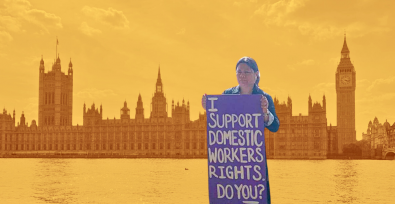By Sophie Levack, Policy Officer at Kalayaan, the U.K.’s leading charity supporting migrant domestic workers
Migrant domestic workers are mostly women. They make up 73% of migrants in private households globally and often face extreme laws in foreign countries, making them vulnerable to exploitation. They perform essential tasks that support families and communities, yet their contributions are often undervalued, and they face stigma and discrimination.
In the U.K., migrant domestic workers are considered low-skilled and are denied the rights that other migrant workers have, including basic safety protections. Since 2012, Government policy has stripped domestic workers of their labour rights, prioritised immigration enforcement and placed worker protections within a trafficking framework.
This means that, over the past 12 years, many migrant domestic workers have been exploited and trapped with abusive employers, unable to seek safety or justice unless their work is akin to human trafficking or modern slavery. Not all abuse and exploitation meets the legal definition, meaning that some workers fall through the cracks and are left open to further abuse.
On Sunday 16th June, in celebration of International Domestic Worker Day, Kalayaan published a report presenting evidence of the abuse faced by migrant domestic workers because of the laws and policies of the past 12 years in the U.K. The report also debunks the myths used by the previous Government to deny these workers their rights. Kalayaan hopes this report can support workers in their fight to regain their rights, standing by them until they do.
Kalayaan believes no abuse should be tolerated and focuses on addressing systemic issues that make people vulnerable to exploitation. While the U.K. Government has acknowledged the vulnerabilities faced by migrant domestic workers, it has mainly focused on rescuing those who have suffered extreme abuse, rather than addressing the root causes.
The report calls for the reinstatement of the pre-2012 visa regime that allowed migrant domestic workers to change employers, renew their visas, and eventually apply for settlement. In that regime, workers felt empowered to enforce their rights, seek redress and find alternative work to escape from abusive employers. Kalayaan urges the incoming Government to protect all migrant domestic workers and allow them to challenge abuse.
Kalayaan’s report, “12 Years of Modern Slavery: the smokescreen used to deflect state accountability for migrant domestic workers” is available to read here.




